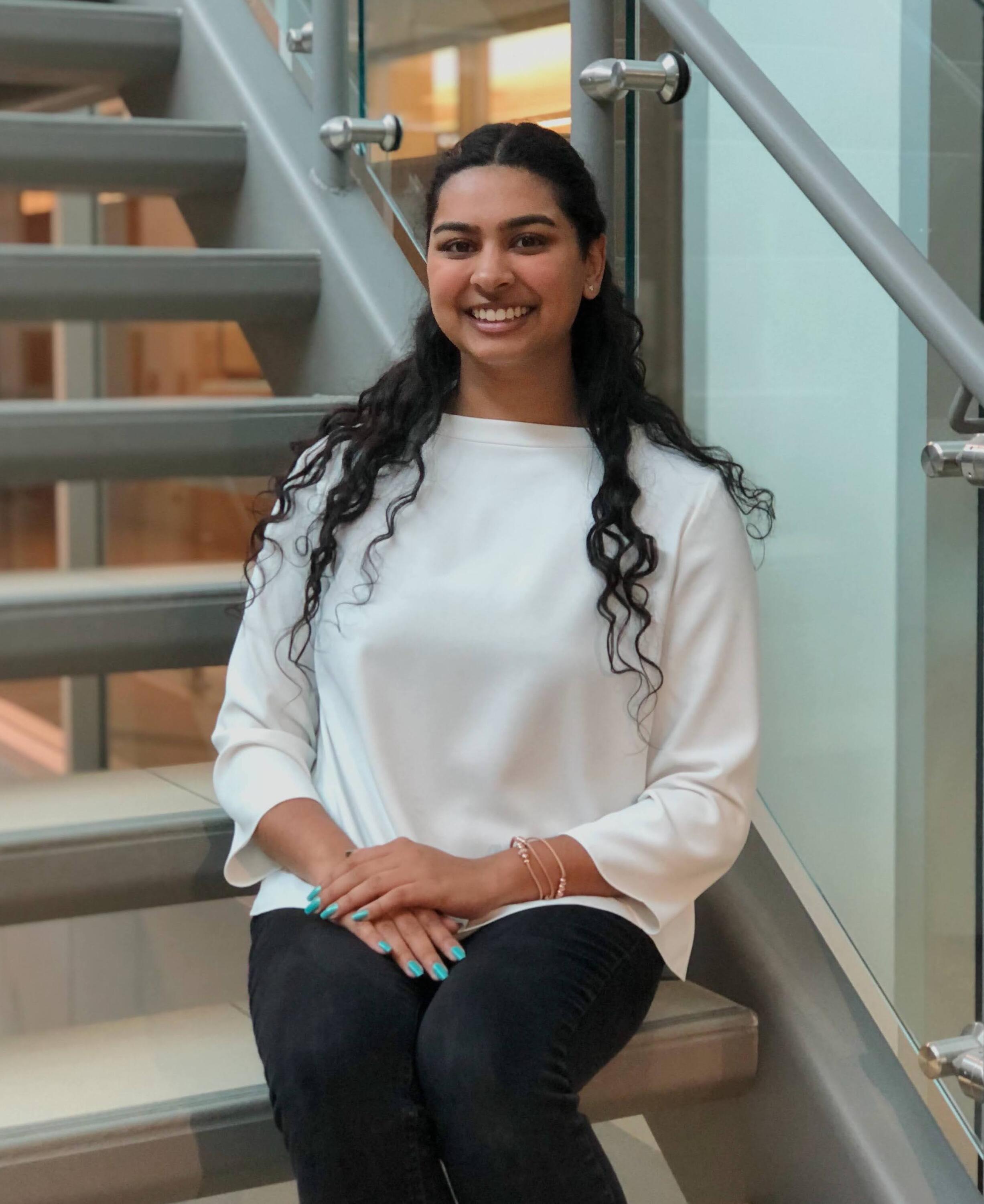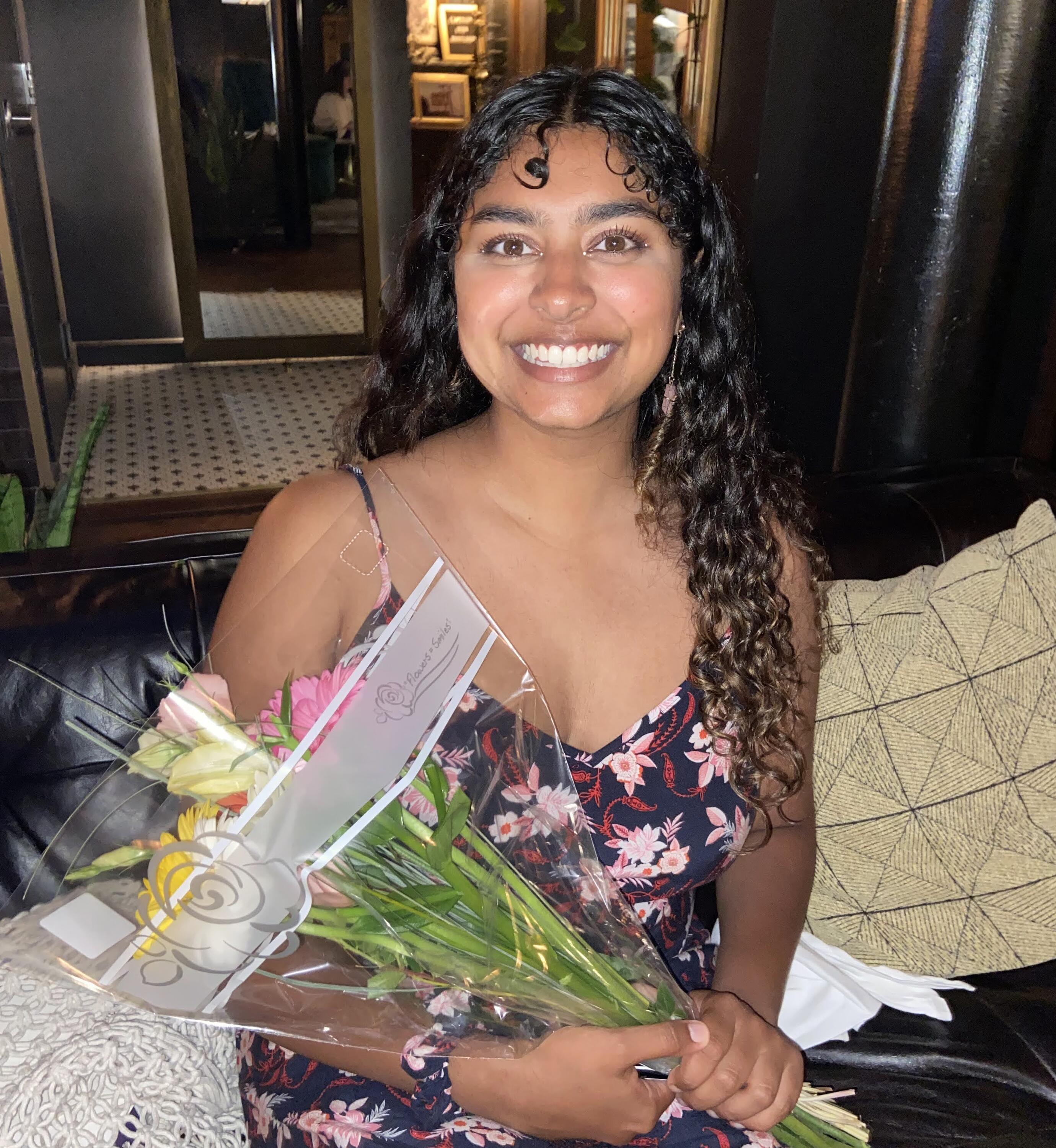Natalie Fernandez, a fourth-year Mechanical Engineering student, shares how her humanitarian heart and passion for engineering lead her down a rewarding, sustainable and international co-op path.
I feel very lucky to have the opportunities I have
Natalie’s co-op journey

Work term 1: JG Mechanical Contracting Inc. was Natalie’s first co-op position in a project assistant role. Her tasks included filling out documentation for their various construction projects and assisting in other projects.
Work term 2: QBuild Software was Natalie’s second co-op where she was hired as a sales engineer. She sold software that was used by engineering companies and managed implementation projects between teams.
Marketing was not initially part of Natalie’s role, however when she noticed the marketing team consisted of only one person who seemed to be struggling, Natalie took the initiative and stepped up to help.
She created an automated inventory system to help better manage their global trade shows and events.
Work term 3: Vexos is a sustainable electronics manufacturing company where Natalie worked as an engineering associate turned front line worker. Unfortunately, this position was altered and cut short due to the pandemic, however, Natalie got to help make ventilators for hospitals in Canada, the United States and Mexico. “I did different jobs like 3D printing designs to help with the process of manufacturing the ventilators. And I also wrote the technical manual for how to assemble the ventilators which then got sent to hospitals.”
Work term 4: Miovision, a traffic annalist and solutions company, where Natalie did her fourth co-op role working remotely as a mechanical design engineer. She designed test setups that would hold all the pieces of the equipment and wiring using a 3D design software and then sent her designs to the company to be built.
Work term 5: Ecobee, a smart energy usage company, is where Natalie did her fifth co-op working remotely. She designed a jig for their assembly line that was used in Canada and Malaysia.
“Once the product came to the end of the assembly line, it would get put into my fixture and then the operator was able to put everything together and build it up really easily. And that sped up production cycle time.” Ecobee still uses Natalie’s designs to this day!
Work term 6: At Running Tide, Natalie specialized in sustainable shellfish and kelp farming for carbon removal to help restore ocean health.

“Because of climate change, the temperatures of the ocean in different localized areas have changed. Around Portland, the fishermen noticed that certain shellfish just weren't in the water anymore. Running Tide is restoring those habitats by growing shellfish in warmer areas in the ocean and then, once they're grown up, bringing them back to clean the waters around Portland, which is really cool.”
Natalie’s role was to help build and design the tipping mechanism that helped automate the process of measuring or “grading” shellfish for size. This helps the shellfish farmers track growth and eliminates having to do it manually.
“It was a very small team. There were three of us working on this giant system that was supposed to grade millions of shellfish.”
“Once or twice a week I would wake up early to go to the boat launch and take a little skiff out to where our reef is. I'd spend the entire day on the reef, in the middle of the ocean, which was really cool. I saw lots of wildlife like jellyfish, seals, porpoises, eagles and a ton of fish.”
“We had to consider a lot of things because we were designing for the water and a lot of metal rusts. Also, the clams are allergic to certain things like brass, which I had no idea about. Different shellfish have different needs in terms of how much space they need to swim around, the temperature of the water or what metals are around them. We had to consider all of that when designing.”
Natalie’s designs would go to a manufacturing facility that worked with water and shellfish friendly materials. It was difficult to test in the environment, so Natalie did online testing on land using pistachios because they are similar in size and have shells.
Running Tide held weekly educational sessions to help give the staff some background in what they were doing and why it was important for the planet.
"Because I don't have much of a biology or environmental background, I didn't really know how growing kelp and shellfish helped or what actually goes into growing the shelter. I got to learn a lot that I wouldn't get in regular schooling.”

What sort of challenges did you face?
“I got the job a month before I was supposed to start, it was last minute. I only got my visa four days before I actually flew out which was stressful, but I would definitely do it all again. It's hard to describe how cool that experience was.”
Natalie struggled with finding last minute housing in Portland, Maine and was surprised to learn that she would need a car as it wasn’t listed in the job description.
“I did talk to my manager and said you need to specify that you need a car on the job description for students in the future. So that was a bit of a struggle.”
Another obstacle was the fact that there were not many female engineers working for the company as most would work in business, HR or software roles, not on the boat.
“The company was started by fishermen who were all men and only in the last few years have more and more women join the company. There are some changes that need to be made.”
How did you feel when you first started co-op compared to how you feel now?
“When I first started, I went in with a mindset of, ‘oh my gosh, I cannot do this kind of thing’. Not very confident in terms of designing a big system or even doing physical work.”
“Now I feel very confident designing big systems because, in the beginning, most of my designs were things that could fit on a desk. Whereas now these are big machines that could fill up a room. So, I definitely feel a lot more confident in my technical skills.
“I also feel a lot more comfortable with the idea of starting somewhere new. I used to think after I graduate, I'm going to stay in Toronto with my family. And now I'm going to go to Europe or the west coast and I know I can do it because I did it once already.”
Do you have any advice for other co-op students?
“Don't get discouraged if you don't get a job through WaterlooWorks because I remember when that happened to me. All of my friends got jobs and I thought, ‘what if I'm not good enough?’”
"Just don't get discouraged. Don't focus on what all your friends are doing because it's easy to look at what everyone else is doing and kind of stray away from what you want.”
“It's very hard, especially in engineering. Alot of students have this, ‘Cali or bust’ mindset, because there's a lot of money in California and they see them as more prestigious or more worthy than other jobs. Some students will only apply to jobs in California during the main round of co-op and feel like they aren’t good enough when they don’t get them.”

“It definitely helped me figure out what I want to do. I think I want to work in something related to climate tech now. That's a big lesson learned.”
What’s next for you?
“I'll graduate soon and I recently finished updating my resume for full-time jobs. I'll probably start applying to jobs but I do have the option to go back to Running Tide, so I still have to decide if I want to do that or not due to seasonal factors.”
“I absolutely want to work in climate tech if I can find a job in that and work on the coast for sure. Being near the ocean was really eye-opening and that is really important to me now.”
“I also started a design team this year for alternative protein. So I might try and work in alternative protein as well.”